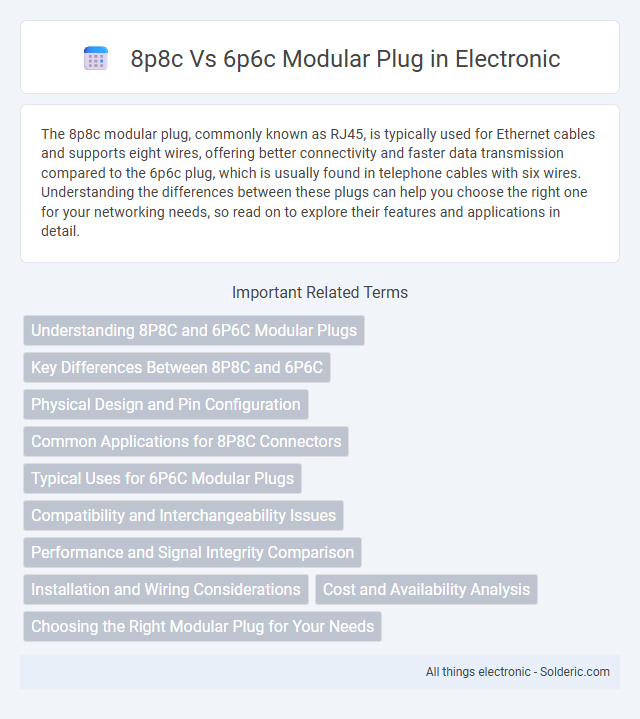The 8p8c modular plug, commonly known as RJ45, is typically used for Ethernet cables and supports eight wires, offering better connectivity and faster data transmission compared to the 6p6c plug, which is usually found in telephone cables with six wires. Understanding the differences between these plugs can help you choose the right one for your networking needs, so read on to explore their features and applications in detail.
Comparison Table
| Feature | 8P8C Modular Plug | 6P6C Modular Plug |
|---|---|---|
| Pin Count | 8 Pins | 6 Pins |
| Contact Count | 8 Contacts | 6 Contacts |
| Common Usage | Ethernet cables (RJ45), networking | Telephone cables (RJ11), voice communication |
| Compatibility | Cat5, Cat5e, Cat6 cables | Telephone wiring, some data applications |
| Connector Size | Larger than 6P6C | Smaller than 8P8C |
| Data Transmission | High-speed data up to Gigabit Ethernet | Lower speed, primarily voice signals |
| Locking Mechanism | Standard snap lock | Standard snap lock |
| Industry Standard | RJ45 (commonly termed, but technically 8P8C) | RJ11 (commonly termed, but technically 6P6C) |
Understanding 8P8C and 6P6C Modular Plugs
The 8P8C modular plug, commonly known as RJ45, features eight positions and eight contacts, making it the standard for Ethernet cables and networking applications that require higher data transmission capabilities. In contrast, the 6P6C modular plug, often referred to as RJ12 or RJ11, has six positions and six contacts, primarily used for telephone wiring and lower bandwidth signals. Understanding the specific pin configuration and application requirements of 8P8C and 6P6C plugs ensures proper connectivity and optimal performance in telecommunications and data networking systems.
Key Differences Between 8P8C and 6P6C
The 8P8C modular plug, commonly used for Ethernet cables, features eight positions and contacts to support four twisted pairs for high-speed data transmission, whereas the 6P6C plug includes six positions and contacts, typically used for telephone and low-bandwidth applications. The key difference lies in their contact count and wiring capabilities, with 8P8C handling higher data rates and broader networking use. Compatibility is limited as 8P8C connectors can physically fit in 6P6C jacks but not vice versa, impacting signal integrity and device interoperability.
Physical Design and Pin Configuration
The 8P8C modular plug features eight positions with eight contacts, enabling it to support all eight wires of standard Ethernet cables, whereas the 6P6C plug has six positions with six contacts, commonly used for telephone connections with fewer wires. Physically, the 8P8C plug is slightly larger to accommodate the additional pins, providing greater data transmission capabilities essential for modern network infrastructure. The pin configuration of the 8P8C supports complex wiring schemes like T568A and T568B standards, while the 6P6C is limited to simpler arrangements, making the 8P8C superior for high-speed communication applications.
Common Applications for 8P8C Connectors
8P8C connectors are predominantly used in Ethernet networking, supporting common standards like Cat5e, Cat6, and Cat6a cables for reliable data transmission in LAN environments. These modular plugs facilitate high-speed internet connections and are essential for RJ45 interfaces found in routers, switches, and patch panels. Your network setup benefits from 8P8C connectors due to their compatibility with modern communication devices and ability to handle up to gigabit speeds efficiently.
Typical Uses for 6P6C Modular Plugs
6P6C modular plugs are primarily used in traditional telephone wiring and older voice communication systems, supporting up to six positions and six conductors for reliable audio signal transmission. They are commonly found in landline telephones, fax machines, and some legacy networking setups where only a few conductors are needed. Their compact design ensures compatibility with standard RJ11 connectors, making them ideal for voice-centric applications rather than high-speed data transfer.
Compatibility and Interchangeability Issues
8p8c and 6p6c modular plugs are often confused but differ significantly in compatibility and interchangeability. The 8p8c plug has eight positions and contacts, commonly used for Ethernet cabling, while the 6p6c plug has six positions and contacts, typically found in telephone wiring, making them incompatible for direct interchange in most networking scenarios. Your choice of plug must align with the cable type and device requirements to ensure proper connectivity and performance without risking damage or signal loss.
Performance and Signal Integrity Comparison
8P8C modular plugs deliver superior performance and signal integrity compared to 6P6C plugs due to their additional wire pairs designed for higher bandwidth and faster data transmission. Enhanced shielding and precision contact alignment in 8P8C connectors minimize crosstalk and electromagnetic interference, ensuring stable and reliable network connections. When optimizing Your network infrastructure, choosing 8P8C plugs supports more advanced Ethernet standards, translating to improved overall communication quality.
Installation and Wiring Considerations
The 8P8C modular plug supports eight wires, allowing for more complex wiring configurations like Ethernet cables, while the 6P6C plug handles six wires, typically used for telephone connections. Installation of 8P8C plugs requires careful alignment of all eight conductors to ensure proper signal transmission, whereas 6P6C plugs demand less precision due to fewer contacts. Your wiring setup choice impacts compatibility and future-proofing, with 8P8C offering greater versatility for data networking applications.
Cost and Availability Analysis
8P8C modular plugs generally have a higher upfront cost compared to 6P6C plugs due to their increased complexity and functionality supporting more conductors. Despite the higher price, 8P8C plugs are widely available because they are the standard for Ethernet and other high-speed communication applications, leading to economies of scale. In contrast, 6P6C plugs are less expensive but less common, mostly used for telephone connections, which limits their availability in comparison to 8P8C plugs.
Choosing the Right Modular Plug for Your Needs
Selecting between an 8P8C and a 6P6C modular plug depends on your device's connectivity requirements and cable type. The 8P8C plug, commonly used for Ethernet cables, supports eight conductors, making it ideal for high-speed network connections and modern telecommunication setups. In contrast, the 6P6C plug suits traditional telephone handsets with six conductors, offering compatibility for voice communication but limited data transfer capabilities.
8p8c vs 6p6c modular plug Infographic

 solderic.com
solderic.com